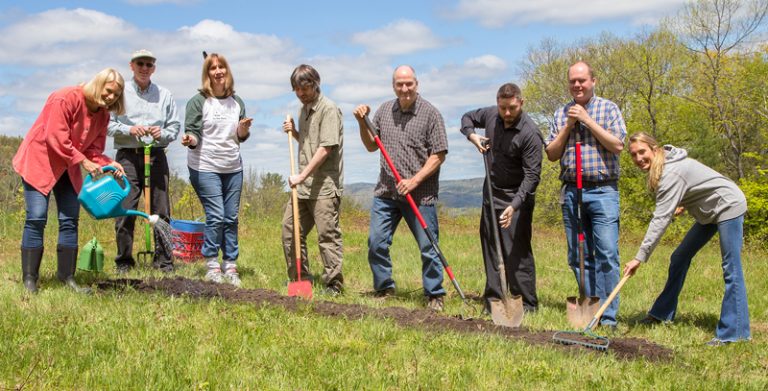
The triple bottom line ("TBL" or "3BL") is a framework that suggests that businesses should not only evaluate their success based on how much profit they've generated, but also based on how much impact they have on social and environmental causes. The term was coined in the 90's by John Elkington, a British business consultant and sustainability evangelist.
At Vermont Woods Studios, we have long been committed to sustainability. Much of the furniture sold in the U.S. today is imported from overseas and built with questionably sourced materials. The global timber trade driven by wood furniture and flooring is run by organized crime and has contributed to worldwide deforestation, especially in critical parts of the world like the Amazon and Borneo Rainforests. Since inception, we've been trying to raise awareness about the problems in this global supply chain and how it all contributes to climate change, human rights violations, species extinction, and more.
Our mission from the start was to decrease the demand for imported furniture by offering an alternative that was made in America with sustainable materials and built to last a lifetime. As we've grown our business, we've doubled down on our commitment to sustainability. We source all our materials responsibly, our products are made in the USA and built to last a lifetime, we work with non profit partners to combat climate change, and we steward a sustainably managed 109 acre working forest at our headquarters in Vermont.
So we thought we were doing pretty well. Then in 2020, our sustainability consultants Alex and Marina at Waste Free Earth introduced us to the concept of triple bottom line sustainability.
Becoming a Triple Bottom Line Business
TBL encourages companies to become more than just the "best in the world." TBL companies aim to be the "best for the world." Triple Bottom Line companies are economically viable, good for the planet, and good for people.
Good for the Planet

The time has passed for individuals and businesses alike to take a "Do No Harm" approach to climate change. Now we must all actively contribute to combatting climate change to avoid disaster. Our sustainability initiatives include sourcing our materials responsibly, manufacturing high quality products that are built to last, conserving and restoring forests around the world, and stewarding a sustainably managed working forest at our headquarters in Vermont.
As a retailer of wood furniture, we are in a unique position. Trees and wood naturally sequester carbon, so using wood to build things can actually be an effective way to store carbon and remove it from the atmosphere. But cutting down trees to build furniture means those trees will no longer be able to continue to pull carbon out of the atmosphere and produce oxygen. That's why we're so proud of our partnership with La Cruz Habitat Protection Program. Through our partnership with LCHPP and our commitment to 1% for the Planet, we'll plant almost 100,000 trees this year on behalf of our customers.
Good for People

The international timber trade is riddled with human rights violations- forced labor, human trafficking, and more. In contrast, our furniture makers receive fair compensation for their considerable talent and are paid a living wage in a safe and healthy work environment. Our manufacturing partners combined employ over 200 people in the state of Vermont.
And Economically Viable
All of the things we do to help combat climate change, and all of the people we employ in this business, none of that would be possible without having a business that generates profit. The Vermont forest economy generates an estimated $1.5B in annual revenue and supports over 10,000 jobs across over 2,000 forest economy businesses. That revenue creates income for land owners, maple producers, loggers, saw mill operators, woodworkers, shippers, marketers, developers, photographers, and our customer service and sales team.
Read more about the economic impact of the Vermont forest economy.
What's Next for Us?
We've accomplished a lot in this business over the last several years, but there's still so much more to do. Here are some of the areas where we recognize there is still work to be done:
- Calculating our carbon footprint so we can measure, evaluate, and improve our net carbon footprint given our operations and partnership with La Cruz Habitat Protection Program
- Creating a sustainability roadmap with aggressive goals for continuing to increase the impact we have on combatting climate change (installing solar panels at our headquarters, shifting our shipping fleet to electric vehicles, etc)
- Identify specific social causes where our collective company voice can help to create positive change, and commit to increasing our impact on social causes
- Continue to grow the business and operate in a way that has a positive impact on the world
- Improve compensation and quality of life for our employees

